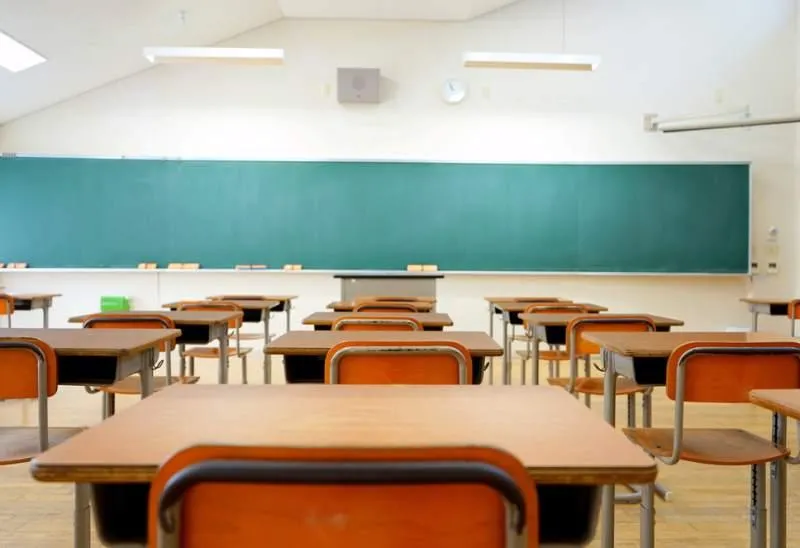Santa Rosa school district calls for more state funding amid teacher strike discussion

The relationship between Santa Rosa school district officials and teachers union leaders has eroded to an acrimonious level amid tense teacher pay negotiations and accusations from the union that the district retaliated against educators for speaking critically against new district policies.
District officials this week vehemently denied the union’s accusations. Nevertheless, union leaders have organized a meeting for later this month to discuss a potential strike.
“The tone and the mood is not good right now,” said Will Lyon, president of the Santa Rosa Teachers Association.
Santa Rosa City Schools, the county’s largest district with about 16,000 students, began negotiations with the union in November over parts of the contract, including teacher salaries. In December, union leaders say, tensions mounted after a high school counselor was given a notice of unprofessional conduct, which could lead to termination, after asking questions about, among other things, a new controversial policy that requires students to take college preparatory classes to graduate.
While teachers have complained they have inadequate health care benefits and teacher pay — the district’s average teacher salary of $72,738 is below the state average — union leaders say the notice to the counselor has exacerbated tensions. Board meetings over the last few months have had a steady stream of students and educators publicly commenting on behalf of the counselor.
Union leaders want the notice rescinded, Lyon said. The district declined to comment or confirm the situation, citing confidentiality rules on personnel issues.
District officials, however, say union leaders are spreading misleading information to stir emotions that could fuel a possible strike. Superintendent Diann Kitamura in an interview this week said contrary to the union’s narrative, she believes in being collaborative and leading from the middle of an organization.
She denied the union’s allegations of retaliatory conduct.
“You’re talking to a child of a parent who went to the internment camps, so, sorry, not in my lifetime will there be any issue of shutting people down from saying what they believe, whether they disagree with me or the district’s policy or not,” Kitamura said.
Union leaders last month made fliers that included contact information and photos of Kitamura and Jenni Klose, the school board president, and claimed administrators were silencing educators who advocate for students.
In response, Klose sent a Feb. 6 email to union leaders, saying the flier was an inflammatory and defamatory personal attack.
“I expressly deny any specific retaliatory conduct, and also want to make it clear that I would consider any actions in retaliation for the exercise of free speech or for advocating for students to be repugnant and absolutely unacceptable,” wrote Klose, a practicing attorney.
Asked whether the he considered the fliers bullying, Lyon said, “The (union) member who’s under threat of being fired is being bullied. An injury to one is an injury to all.”
All the while, teacher pay negotiations have continued for over four months.
On Feb. 4, the union filed a request for impasse to the Public Employment Relations Board, a state agency that enforces collective bargaining laws. The agency determined there was still room for negotiations and denied impasse four days later, said Felix De La Torre, the board’s general counsel.
In the latest bargaining session on March 7, the district offered a 5.5 percent salary increase over two years. The union countered with a 5.5 increase this upcoming school year, and a 4.5 percent increase the following year.
Teachers currently are eligible for a $5,300 annual medical contribution, which about half of all the district’s 900 teachers participate in. The district offered a $1,400 increase in health benefits over two years.
However, the union countered, asking for a $3,000 increase over the next two years.
The union’s compensation demands could put the district’s budget in deficit, Kitamura said. The district’s budget is $180 million, and 52 percent is spent on teacher pay and benefits.
Kitamura said she would prefer for the district and union unite and demand more funding for schools from Sacramento before Gov. Gavin Newsom enacts his budget this June. Seventy-seven percent of the district’s revenue comes from state and property taxes.
“In order to operate districts, we need more money. That’s just the bottom line,” Kitamura said.
Lyon, who participated for two days in last month’s Oakland teacher strike, argued the Santa Rosa school district has wiggle room in the budget to meet the union’s demands for higher pay and benefits.
“I believe in my bones there’s enough money there that can make us an offer that we can ratify,” Lyons said.
The next bargaining session is March 27. Teacher pay and class size negotiations are still on the table. The union’s strike plan meeting is scheduled the next day.
If teachers were to strike, the union would need an 80-percent approval vote from its members, Lyon said.
The last strike between the district and the union was in 1980, Kitamura said. It lasted 36 days.
Klose was a fifth-grader at the time, and she said the strike set an atmosphere of distrust that still affects Santa Rosa schools today. She said the recent public arguments between district and union leaders aren’t a good model of civility for students.
During a board meeting last month, Klose suggested having a communications professional help mediate dialogue between the union and the district.
“Clearly we need help, professional help,” she said during the Feb.13 meeting.
Lyon rejected the offer two weeks later, saying he wasn’t convinced it was genuine.